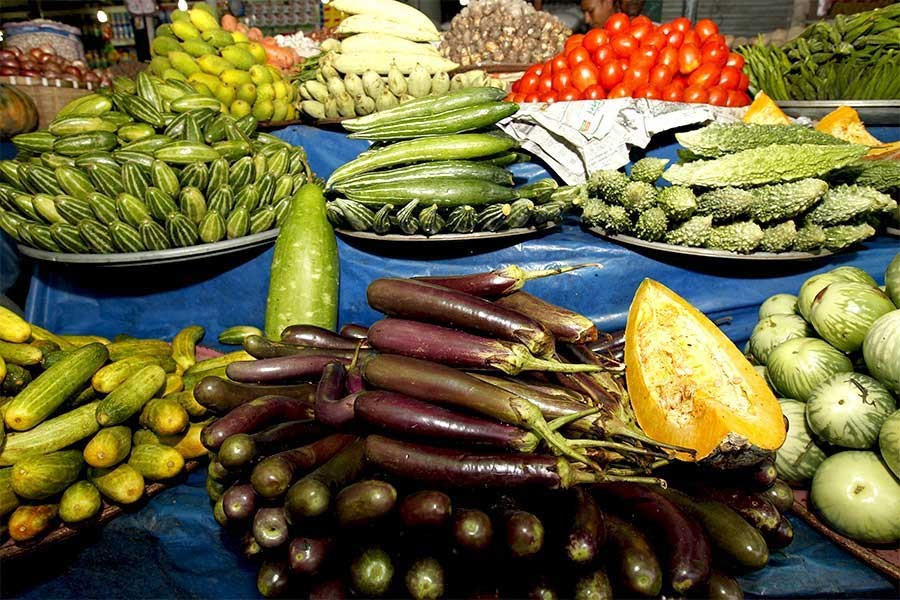Supply of essential commodities in markets is quite normal as one could see stacks of fresh vegetables there. Prices in the international market too are coming down. In spite of this, prices of rice, dal (lentil), edible oil, onion and vegetables have gone beyond purchasing capacity of common buyers. Some coteries of businessmen are apparently creating this abnormal situation.
There is also a lack of proper monitoring of prices by the government agencies. There has been an upward trend in prices of fish and meat. Lower and middle-income people are spending their entire income on food items. All sides involved in market situation, are showing different excuses. The government is saying that there is no supply shortage but prices are high. Businessmen do not agree with this.
Economists say price monitoring is the responsibility of the government. If prices are controlled by a group, it harms the interests of the consumers. The government has to ensure a competitive environment. But this is not happening. Some individuals/groups are controlling prices of essentials. They manipulate prices. Open market system is not enough. The government must retain the control mechanism. In this context, the capacity of the Trading Corporation of Bangladesh (TCB) will have to be increased. Protecting the interests of the consumers appears to be a difficult job.
Inflation is increasing because of higher rice prices. Prices started rising before the last Eid-ul Azha. Gradually, prices of ata, edible oil and dal started rising. Recently, prices of green chillies and onion have increased. The rice traders' association said prices increased because of manipulation by the millers. They allegedly made a stock of paddy/rice. But prices have started coming down now. Price may not increase further because of start of Aman season.
The president of the consumer association of Bangladesh said that rise and fall of prices are natural. Problem arises when there is an unusual price rise. According to him, the government will have to take the initiative to control the situation. Businessmen are increasing prices on different pretexts. There are many agencies for controlling prices but they are not effective. Price of rice started rising from the month of February. The price was unstable in September after Eid-ul Azha. After imports on several occasions, the prices came down a little bit but it is not yet within the reach of common people. Sarna variety of rice is now selling at Tk 44/45kg. Nazirshail is selling at Tk68/70. Rice price too is falling in the international market.
According to the Food and Agriculture Organisation (FAO), prices of food items came down by1.3 per cent. Edible oil price fell by 1.1 per cent. Milk product price dropped by 4.2 per cent. Meat price went down by 2 per cent and sugar price decreased by 7 per cent. But such price cuts did not have any impact in Bangladesh.
In recent times, market for onions has become unstable. In August, the price was Tk 40/42 per kg. Imported onion cost Tk30/35 per kg. The price has doubled in this month. Local variety of onions is now selling at Tk100kg and imported onion is selling at Tk70/75 kg. The price may come down when the new variety is available in the market. In Khatunganj of Chittagong, price of onion has declined by Tk 35.40 per kg.
Winter vegetables have started coming to markets. But it is being sold at high prices. New potato is selling at Tk 100/110. Bitter gourd is selling at Tk 60 kg. Pumpkin is selling at Tk 60 unit. Cauliflower is selling at Tk 60 per piece. Lalshak is selling at Tk 30 per bundle. Brinjal is selling at Tk 75/80.Three months back, prices of these items were half of the present price level. Soyabean oil is selling at Tk 95 per litre. Bottled soyabean oil is selling at Tk 110.Good quality masur dal is selling at Tk 95 per kg. Meat sells at Tk 500/520kg.Goat meat costs Tk 700/750 a kg.
What is very serious is that prices of life-saving drugs are on the increase. The drug administration is unable to control prices. All drug companies are united in raising prices. It is said that salary increase of government officials and employees, rise in prices of raw materials, packaging and printing cost and increase in prices of dollar compared to local currency are some of the reasons being cited for price increase of drugs. The drug administration approves price rise after looking into the proposals and papers submitted by drug companies. Prices have increased in respect of insulin, medicine for high blood pressure, cough syrup, medicine for thyroid, inhaler, medicine for gastric, paracetamol, anti-biotic and vitamin.
According to 1982 Drug Policy, the government used to fix prices of drugs after looking into cost elements and profit. But now drug companies fix prices which are approved by drug administration. Consumers are worried about such price rise. The government must have some mechanism for checking drug prices. Consumers can not be left to the free-wheeling tactics of drug companies.
The writer is an economist and columnist [email protected]


